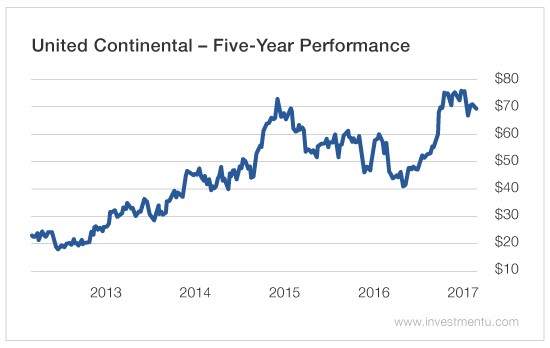We all love to hate the airlines.
The cramped seats. The lousy food. Delayed or cancelled flights. And now we have this week’s incident at United Continental Inc (NYSE:UAL).
By now, virtually everyone knows the story. To avoid cancelling a flight the next morning, United needed to find space for four employees on a sold-out flight from Chicago’s O’Hare International Airport.
Yet not enough passengers would volunteer to give up their seats.
So the gate staff chose an onboard passenger at random - Dr. David Dao - and told him to get off the flight.
Dao refused.
So the airline called the police. And in a video that has been viewed millions of times on YouTube, security drags him, bleeding from the mouth, off the plane.
In the annals of PR fiascoes, this may have set a new low. Especially after CEO Oscar Muñoz - though he later issued an abject apology - initially made flimsy, “CYA” excuses for the outrage, even referring to Dao’s (ahem) reaccommodation.
The sad thing is United, a company with a troubled history - including the largest bankruptcy ever by an airline and the sixth-largest by a U.S. corporation - has recently enjoyed a string of successes.
Its shares have nearly doubled since last summer and tripled over the last five years.

But this week’s events gave the company a black eye. And gave plenty of ammunition to anti-business populists who would like to fine the airline, outlaw the practice of overbooking, and drag Muñoz before Congress for the ritual public humiliation. (Recall a stammering John Stumpf last year at the hands of Elizabeth Warren.)
A friend of mine - Hal - lost no time chiding me for regularly praising the private sector and criticizing the government.
“See,” he said. “This week’s incident shows everyone how corporations really feel about their customers.”
Except Hal has it exactly backward. What United Airlines did was stupid - and outlandish - precisely because the company behaved like a government agency, using brute force to achieve its objectives.
In a free-market economy, every transaction is supposed to be voluntary. If you don’t like a company, you don’t have to supply it, work for it, buy from it or own its shares.
It’s governments - not businesses - that require peaceful, law-abiding citizens to accede to their demands whether they want to or not.
What United did was especially foolish since there is a simple, quick, free-market solution to overbooked flights. It’s called a gate auction.
For example, imagine 211 people show up for a flight with 200 seats. The airline would offer a voucher for a certain amount, say $300, for 11 volunteers to surrender their seats. If it can’t get 11 people to accept that, it has to raise the price to $400, then $500 and, ultimately, to whatever amount it takes to get 11 people to agree to give up their seats.
Trust me. That solution is far cheaper than the eventual settlement with Dao and his attorneys will be.
Many of the things we don’t like about airlines are actually market-driven solutions. For example, airline executives learned years ago that the overwhelming majority of passengers are interested in one thing and one thing only: the cheapest price.
Most fliers will give up additional legroom, checked luggage, drinks and snacks, and other frills for a lower ticket price. So airlines make flights as cheap as possible and then charge for the extras.
The ultimate beneficiary is the flier. You get less expensive flights. And if you want more, you can pay for it.
As for overbooking, the practice is legal, makes good economic sense, and doesn’t inconvenience many passengers.
The Department of Transportation reported that 41,000 fliers were involuntarily bumped from flights last year. That sounds like a lot until you realize that there were 660 million passengers in 2016.
So we’re talking about 0.006% of fliers.
Yes, airlines overbook to boost sales and earnings. But it also saves you money.
If your flights regularly had tons of empty seats - thanks to all the cancellations and changes - your ticket price would be higher.
Airlines actually do a pretty good job of getting us from Point A to Point B. Flying is considerably safer than driving. (And it's a long swim to Europe or Asia.)
So let’s hope that United - and its competitors - smarten up about overbooking and use a gate auction every time.
If they want us to fly their friendly skies, they need to give us the treatment we deserve.
Paying customers are indispensable assets. Markets work better than force.
And happy, satisfied customers? They generally don’t sue.
